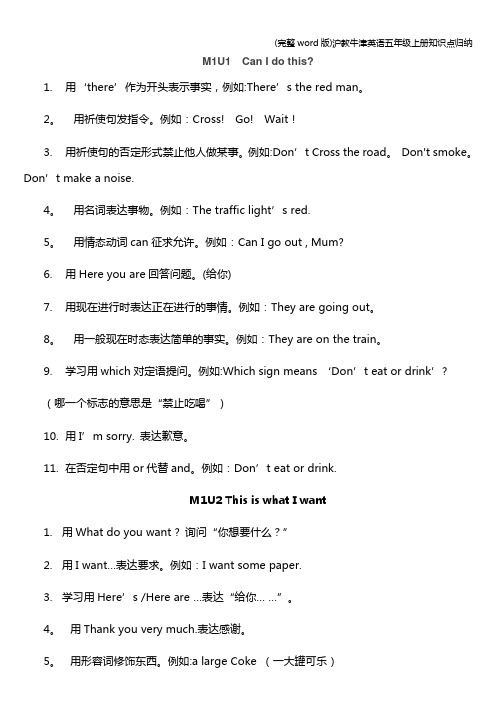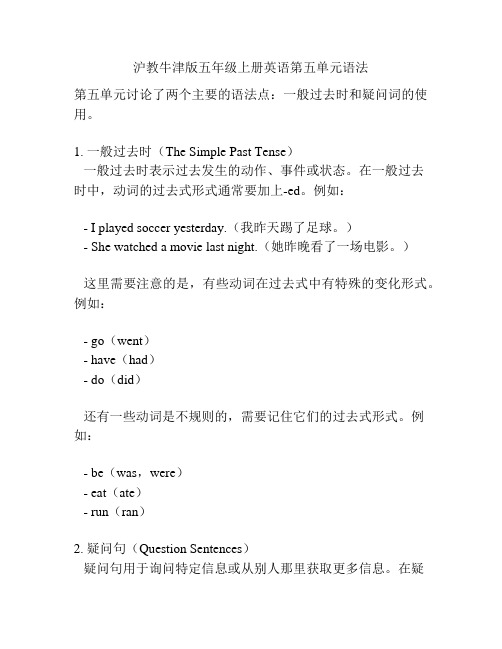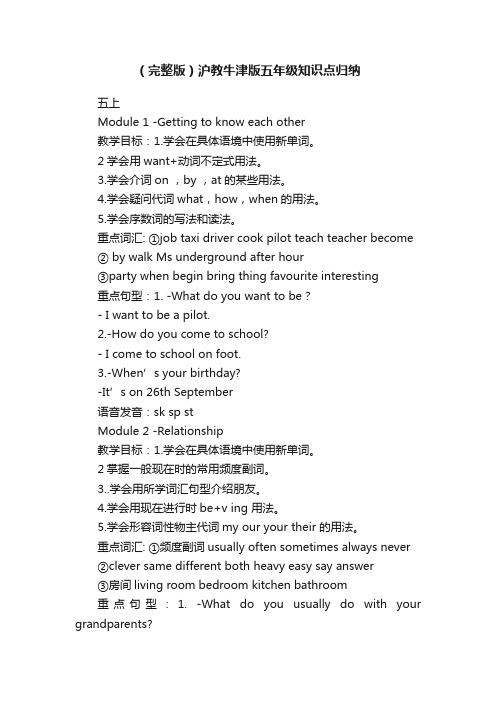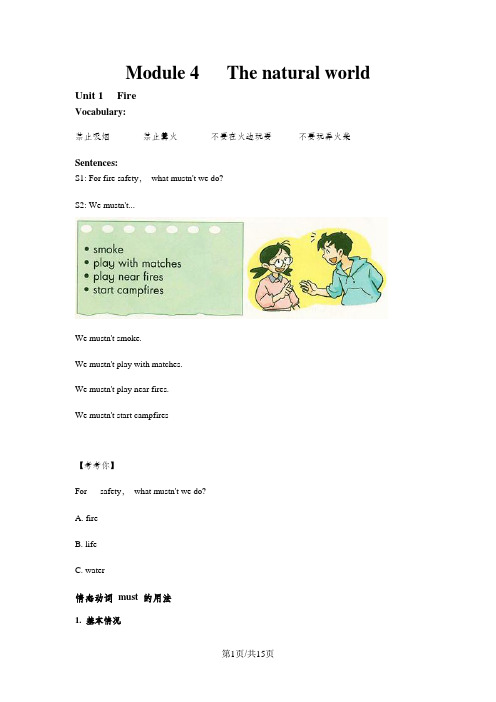(完整)五年级上册沪教版英语语法
(完整word版)沪教牛津英语五年级上册知识点归纳

M1U1 Can I do this?1. 用‘there’作为开头表示事实,例如:There’s the red man。
2。
用祈使句发指令。
例如:Cross! Go! Wait!3. 用祈使句的否定形式禁止他人做某事。
例如:Don’t Cross the road。
Don't smoke。
Don’t make a noise.4。
用名词表达事物。
例如:The traffic light’s red.5。
用情态动词can征求允许。
例如:Can I go out , Mum?6. 用Here you are回答问题。
(给你)7. 用现在进行时表达正在进行的事情。
例如:They are going out。
8。
用一般现在时态表达简单的事实。
例如:They are on the train。
9. 学习用which对定语提问。
例如:Which sign means ‘Don’t eat or drink’?(哪一个标志的意思是“禁止吃喝”)10. 用I’m sorry. 表达歉意。
11. 在否定句中用or代替and。
例如:Don’t eat or drink.M1U2 This is what I want1. 用What do you want ? 询问“你想要什么?”2. 用I want…表达要求。
例如:I want some paper.3. 学习用Here’s /Here are …表达“给你… …”。
4。
用Thank you very much.表达感谢。
5。
用形容词修饰东西。
例如:a large Coke (一大罐可乐)6。
用情态动词can征求许可。
例如:Can I have some fish,please?7。
学习关于菜的名称。
例如:noodles、vegetablesM1U3 This is what I need1。
关于学习用品的单词。
例如:books.2。
用’What do you need for school ?' 询问“你上学需要什么?"3。
完整沪教牛津英语五年级上册知识点归纳

M1U1 Can I do this?1. 用‘there'作为开头表示事实,例如:There's the red man。
2. 用祈使句发指令。
例如:Cross! Go! Wait!3. 用祈使句的否定形式禁止他人做某事。
例如:Don't Cross the road. Don't smoke. Don'tmake a noise.4. 用名词表达事物。
例如:The traffic light's red.5. 用情态动词can征求允许。
例如:Can I go out , Mum?6. 用Here you are回答问题。
(给你)7. 用现在进行时表达正在进行的事情。
例如:They are going out。
8. 用一般现在时态表达简单的事实。
例如:They are on the train.9. 学习用which对定语提问。
例如:Which sign means ‘Don't eat or drink'? (哪一个标志的意思是“禁止吃喝”)10. 用I'm sorry. 表达歉意。
11. 在否定句中用or代替and。
例如:Don't eat or drink.M1U2 This is what I want1. 用What do you want ? 询问“你想要什么?”2. 用I want…表达要求。
例如:I want some paper.3. 学习用Here's /Here are …表达“给你……”。
4. 用Thank you very much.表达感谢。
5. 用形容词修饰东西。
例如:a large Coke (一大罐可乐)6. 用情态动词can征求许可。
例如:Can I have some fish, please?7. 学习关于菜的名称。
例如:noodles、vegetablesM1U3 This is what I need1. 关于学习用品的单词。
(完整)五年级上册沪教版英语语法

Module 4The natural worldUnit 1FireVocabulary:严禁抽烟严禁篝火不要在火边嬉戏不要玩弄火柴Sentences:S1: For fire safety, what mustn't we do?S2: We mustn't...We mustn't smoke.We mustn't play with matches.We mustn't play near fires.We mustn't start campfires【考考你】For __ safety, what mustn't we do?A.fireB.lifeC.water神态动词must的用法1.基本状况must和其余神态动词同样,没有人称和数的变化,后接动词原形,表示某种语气和神态。
如:We must work hard at English.我们应当努力学习英语。
2. 详尽用法a. 在一定句中, must表示“一定;应当”的意思,后者一般指在第一人称中。
如:I must(我应当), we must(我们应当),其余人称一般表示“一定”的意思。
如:You must talk to them about their study.你一定同他们说说对于他们学习的事。
b. 变为否认句,要在must以后加not ,经常缩写成mustn ’t,均表示“严禁;不可以够;不同意;不一样意”等意思。
如:Children mustn’ t play on the road. It’ s very dangerous.孩子们不一样意在路上嬉戏,这样特别危险。
You mustn't leave here.你不可以走开这儿。
考考你:1、我们全部都一定顺序渐进地做。
We __ do everything step by step.A. canB.couldC. mightD. must2、严禁在这儿抽烟。
沪教牛津版五年级上册英语第五单元语法

沪教牛津版五年级上册英语第五单元语法第五单元讨论了两个主要的语法点:一般过去时和疑问词的使用。
1. 一般过去时(The Simple Past Tense)一般过去时表示过去发生的动作、事件或状态。
在一般过去时中,动词的过去式形式通常要加上-ed。
例如:- I played soccer yesterday.(我昨天踢了足球。
)- She watched a movie last night.(她昨晚看了一场电影。
)这里需要注意的是,有些动词在过去式中有特殊的变化形式。
例如:- go(went)- have(had)- do(did)还有一些动词是不规则的,需要记住它们的过去式形式。
例如:- be(was,were)- eat(ate)- run(ran)2. 疑问句(Question Sentences)疑问句用于询问特定信息或从别人那里获取更多信息。
在疑问句中,动词要移动到主语之前。
例如:- Did you go to the park yesterday?(你昨天去公园了吗?) - What did you eat for breakfast?(你早餐吃了什么?)疑问词用于提问特定信息。
常见的疑问词有:who(谁)、what(什么)、where(哪里)、when(什么时候)、why (为什么)、how(如何)等。
例如:- Who is your teacher?(你的老师是谁?)- Where did you go on vacation?(你去哪里度假了?)在疑问句中,当提问特定对象或事物时,要使用特定的疑问词,而当提问原因、方式等时,要使用特定的疑问词。
沪教版五上英语单元知识汇总

沪教版五上英语单元知识汇总以下是沪教版五年级上册英语各单元的知识汇总:Unit 1 My Future单词:•future(将来,未来)•want(想要)•pilot(飞行员)•teach(教)•cook(厨师,烹饪)•taxi driver(出租车司机)•job(工作)•singer(歌手)•fall/drop(掉落)•lifeguard(救生员)•save(救助,节约)•become(变成,变得)•短语:••fly a plane(驾驶飞机)•in the sky(在空中)•help people(帮助人们)•teach English(教英语)•in a school(在一所学校)•cook nice/delicious food(做美味的食物)•be afraid of+动词ing(害怕……)•be good at+动词ing(擅长……)•fall/jump into the lake(掉入/跳入湖中)•want to+动词原形(想要做某事)•句型:••What do you want to be? I want to be a/an+职业.•What does he/she want to be? He/She wants to be a/an+职业.•Do you want to be a/an+职业? Yes, I do./No, I don’t.•Does he/she want to be a/an+职业? Yes, he/she does. No, he/she doesn’t.Unit 2 Going to School•单词:••by(表示方式)•walk(步行)•Ms(女士)•journey(旅程)•primary school(小学)•underground(地铁)•station(车站)•take(乘坐,带领)•after(在……之后)•hour(小时)•短语:••by bus(乘公交车)•by car(乘小汽车)•by bike(骑车)•on foot(步行)•far from(离……远)•walk to school(步行去学校)•journey to work(上班旅程)•at Happy Primary School(在开心小学)•on Green Street(在格林大街)•an underground station(一个地铁站)•take the train(乘火车)•get off the train(下火车)•at Park Street Station(在公园街站)•take Bus No.12(乘12路公交)•at Spring Street Bus Stop(在春街公交站)•after an hour(在一小时后)•句型:••How do you come to school? I come to school+介词短语. •How does he/she go to school? He/She goes to school+介词短语.•I live far from/near school.Unit 3 My Birthday•••party(聚会)•when(什么时候)•begin(开始)•bring(带来)•thing(东西,事物)•favourite(最喜欢的)•interesting(有趣的)•hat(帽子)•短语:••birthday party(生日聚会)•some orange things(一些橙色东西)•an orange party(一次橙色聚会)•That sounds interesting.(那听起来很有趣)•I can’t wait!(我等不及了)•Happy birthday!(生日快乐)•••Can you come to my birthday party? Sure.•When’s your birthday? It’s on+具体日期.•What time does the party begin? It begins at+具体时间.。
五年级上册沪教版英语语法

特殊疑问句要求回答具体内容。 不能用 yes 或 no 回答。
How表示“怎么样”,是询问情况的疑问句。
which 表示“哪一个”,是询问选择的疑问词。
例句:
HowdoIgettothehospital?
Walkalongthestreet,thenturnleftandyoucanseetheh ospital.
B. mustn't
--------------------------------alworld
Unit1
Wind
Vocabulary:
gently
adv. 温和地
strongly
adv. 强劲地,猛烈地
slowly
adv. 缓慢地
quickly
Module4 Thenaturalworld
Unit1
Fire
Vocabulary:
禁止吸烟
禁止篝火
玩耍
不要玩弄火柴
Sentences: S1:Forfiresafety,whatmustn'twedo?
S2:Wemustn't...
Wemustn'tsmoke. Wemustn'tplaywithmatches. Wemustn'tplaynearfires. Wemustn'tstartcampfires 【考考你】 For__safety,whatmustn'twedo? A.fire
Howdoyougotoschool?
Igotoschoolbybike/
Whichappledoyoulike,theredoneorthegreenone?
Iliketheredone.
沪教版英语五年级上册各单元重点

沪教版英语五年级上册各单元重点短语:1play basketball。
2play the piano。
3play with friends。
4watch TV。
5read books。
6do homework。
7take a walk。
8go swimming。
9have a ic。
10visit grandparents句型:1What do you like to do in your free time。
I like to play basketball.2She is good XXX.3I often play with my friends after school.XXX.5She enjoys XXX.6I have a lot of homework to do tonight.7We like to take a walk in the park on XXX.XXX.9Let’XXX.10I XXX.XXX at home。
have a balanced diet。
eat junk food。
order takeout。
go grocery shopping。
prepare meals。
follow a recipe 句型1What kind of food do you like?I have a sweet tooth。
so I love desserts.2Do you enjoy trying new foods?Yes。
I love to try new things.3Do you eat out at restaurants often?Not really。
XXX.4It’XXX and not just eat junk food.5Sometimes I’m too busy to cook。
so I order takeout or go grocery shopping to prepare meals at home.1play the piano 2sing a song 3write a story 4draw a picture 5take photos 6go to the cinema 7read a book 8listen to music9dance to the music 句型1I like playing the piano in my free time.XXX.3He is writing a story about his travels.4My little sister loves to draw pictures.5I enjoy taking photos of nature.6Let’s go to the cinema to watch a movie.7Reading a book is a great way to relax.8I like to listen to music while I work.9She loves to dance to the music.Unit 9Phrase and ns:1.Walk along2.XXX left3.Excuse me4.Walk straight5.On the right6.A map of the zooXXX:1.Excuse me。
沪教版深圳 五年级英语上册每单元重点句型和语法

小学英语沪教深圳版 五年级上册重点句型及语法Unit 1 My futureWhat do you want to be?-- I want to be a doctor. want to be+职业:想成为....What do you want to do? want to +动词原形:想要做...-- I want to help people. (遇到第三人称单数简称“三单” do变does )What does he want to be?---He wants to be a pilot.Unit 2 Going to schoolHow do you come to school?遇到“三单”动词一般+S--- I come to school on foot.= I walk to school. do 变does , go 变goesHow does Alice come to school? watch 变watches , teach 变teaches--- She comes to school by bike.Unit 3 My birthday When’s your birthday? --- It’s on 21st September.= It’s on September 21st . What time does the party begin? --- It’s begins at two o’clock in the afternoon.Unit 4 GrandparentsWhat do you usually do with your grandparents? --- I usually play chess with my grandpa. What does your grandpa usually do with you? --- He usually reads books with me. Do you play sport with your grandparents? --- Yes. I sometimes play table tennis with them.Does your grandmother sometimes go shopping with you ?---No, she doesn’t.Unit 5 FriendsWe both like sport. Alice and I both like English. We are both ten years old. Kitty,Peter and I all like sport. We are in the same class.We are in different classes.Unit 6 Family lifeWhat are you doing? --- I’m doing my homework. Where are you ?--- I’m in the living room.What does Kitty doing?---Are you in the kitchen?---No. I’m in the bathroom.Unit 7 At the beachAre you doing your homework?--- No, I’m not. I’m writing a letter.Is Paul collecting shells?---Yes, he is.--- No, he isn’t.--- Yes, she is.----No, she isn’t.Unit 8 An outing Array What are you doing?--- I’m reading the map.What is he/she doing?----He’s /She’s riding a bike.How do I get to the post office?--- Walk along Winter Street.--- Turn left (right) at Spring Street.--- Walk straight .---- It’s between the cinema and the flower shop.Unit 10 Wind Array The flowers are dancing in the wind softly.The children are flying their kites happily.It is blowing strongly.The windmill is moving slowly.The windmill is moving quickly.Unit 11 Water--- We use water to wash our hands.Where does water come from?---- It comes from the sea/rain/tap.Unit 12 FireWhat mustn’t we do in the forest or at home?--- We mustn’t play with matches at home.。
五年级上册沪教版英语语法

Module4 ThenaturalworldUnit1 FireVocabulary:禁止吸烟禁止篝火不要在火边玩耍不要玩弄火柴Sentences:S1:Forfiresafety,whatmustn'twedo?S2:Wemustn't...Wemustn'tsmoke.Wemustn'tplaywithmatches.Wemustn'tplaynearfires.Wemustn'tstartcampfires【考考你】For__safety,whatmustn'twedo?A.fireB.lifeC.water情态动词must的用法1.基本情况must和其他情态动词一样,没有人称和数的变化,后接动词原形,表示某种语气和情态。
如:WemustworkhardatEnglish.我们应该努力学习英语。
2.详细用法a.在肯定句中,must表示“必须;应该”的意思,后者一般指在第一人称中。
如:Imust(我应该),wemust(我们应该),其它人称一般表示“必须”的意思。
如:Youmusttalktothemabouttheirstudy.你必须同他们谈谈关于他们学习的事。
b.变成否定句,要在must之后加not,常常缩写成mustn’t,均表示“禁止;不可以;不许可;不允许”等意思。
如:Childrenmustn’tplayontheroad.It’sverydangerous.孩子们不允许在路上玩耍,这样非常危险。
Youmustn'tleavehere.你不能离开这儿。
考考你:1、我们一切都必须循序渐进地做。
We__doeverythingstepbystep.A.canB.couldC.mightD.must2、禁止在这儿吸烟。
We__smokehere.A.can'tB. mustn't---------------------------------------------- Module4 ThenaturalworldUnit1 WindVocabulary:gently adv.温和地strongly adv.强劲地,猛烈地slowly adv.缓慢地quickly adv.迅速地,很快地Sentences:Itblowsgently.【练一练】Thereisnowind.Thechildrenswim___inthesea.A.gentlyB. quicklyC. stro nglyModule4 ThenaturalworldUnit1 WaterVocabulary:first adv.首先next adv.其次,紧接着then adv.然后finally adv.最后Sentences:First/Next/Then/Finally,...【练一练】-Whatdowedo___?-First,weboilthewater.A.finallyB.FirstC.nextD.thenModule3 Placesandactivities语法知识(2)how/which以特殊疑问词开头,对陈述句中的某一部分提出疑问/进行发问的句子叫特殊疑问句。
【沪教】五上英语知识点总结

【沪教版】五年级(上册)英语:知识点总结Module 1Getting to know each other一、核心词汇1.名词:future 将来;未来pilot 飞行员job 工作;职业singer 歌手lifeguard 救生员Ms 女士journey旅程;旅行underground地铁station 车站hour 小时party 聚会thing 东西;事物hat 帽子2.动词:want 想要teach 教(课)fall 掉落;落下save 救;救助;节约become 变成;变得walk 走;步行take 乘坐(交通工具);带领begin 开始bring 带来3.形容词:favorite 最喜欢的interesting 有趣的4.介词:by(表示方式);靠近after 在……后5.副词:when 什么时候6.兼类词:cook 厨师;烹饪7.短语:taxi driver 出租车司机(be) good at 擅长primary school 小学bus stop 公共汽车站by bus 乘公共汽车far from 离……远on foot 步行by bike 骑自行车by car 乘小汽车get off 下车have fun 尽情玩二、拓展词汇1.名词:doctor 医生teacher 老师sky 天空subject 科目2.月份名词:January (Jan.) 一月February(Feb.) 二月March(Mar.) 三月April(Apr.) 四月May 五月June(Jun.) 六月July(Jul.)七月August(Aug.) 八月September(Sept.) 九月October(Oct.) 十月November(Nov.) 十一月December(Dec.) 十二月3.动词:help 帮助4.短语:fly a plane 驾驶飞机be afraid of 害怕三、核心句型1.—What do you want to be? 你想要成为什么?—I want to be a pilot. 我想要成为一名飞行员。
沪教版上海牛津英语五年级上册知识点整理

Module1 Getting to know youUnit1 My birthday 生词:first second third fourth fifth sixth 音标:语法:When is your birthday?It ’s on the...of January/February/March/April/May/June/July/August/September/October/November/December.Unit2 My way to school 生词:taxi underground zebra crossing traffic lights pavement 音标:语法:How do you come to school? I come to school...Unit3 My future 生词:worker pilot farmer cook shop assistant 音标:语法:What do you want to be?I want to be a/an.../i://i/e she me i it this e_e these Chinese drill fish ee bee sweet yeasy very easeareadhappyearly/e//?/e bed pet adad back a any many appleblackeaheadbread/p/p pick map /b/bbookjob/t/t taste fruit /d/ddatebad/k/kkite work c cook picnic ck clock duck /g/ggamebigModule2 Me,my family and friendsUnit1 Grandparents生词:write an e-mail go shopping play chess音标:/a://Λ/a class past u us clubask bath duck puzzle ar arm park o other sonsharp large love colour语法:How often...Unit2 Friends生词:Same different both all音标:/u://?/u rule u sugar fullput pull oo too school oo book lookroom tooth cook foot语法:sb. both...(do)...Unit3 Moving home生词:West north east south音标:/f/f food roof/v/v van live/θ/th think tooth/e/th that with语法:Why...Because...Module3 Places and activitiesUnit1 Around the city 生词:Hotel bank hospital bakery museum cinema 音标:语法:How do I get to...,please?Walk along...Unit2 Buying new clothes 生词:button zip pocket 音标:语法:Which ... Do you like, the ... One or the ... One?I like the ... One.Unit3 Seeing the doctor 生词:fever toothache cough cold 音标:语法:What should I do?You should.../s/s sigh bus c city nice /z/z zoo size svisitis/ts/tslights parts boats rabbits /dz/dscards clouds handsbeds/?://?/or short horse o office box al hall fall off wrong au autumn naughty awhat wantoordoorfloorwatch/?://?/er her term er teacher paper ir bird third driver farmer ur nurse turn apanda banana or workwordagainalongModule4 The nature wordUnit1 Water生词:first next then finally音标:/t?//?/ch cheap rich sh share fishChina each shirt brush/d?//?/g age giraffe s usually pleasureorange cage televisionj job juicejam jump语法:First/Next/Then/Finally,...Unit2 wind生词:gently stronger slowly quickly音标:/tr//dr/tr tree try dr dress drytrain trunk drink drawtriangle traffic drive dream语法:It is blowing gently.Unit3 Fire生词:Don’t smoke Don’t start campfires Don’t play near fires Don’t play with matches 音标:/i:/sheep/i/ship/e/bed/?/bad/p/pig/b/big/t/hat/d/had/k/back/g/bag/ɑ:/father/?/brother/u:/food/?/foot/f/leaf/v/leave/θ/both/e/with/s/piece/z/please/?:/water/?/what/?:/purple/?/paper/t?/rich/d?/giraffe/?/sure/?/pleasure语法:We must/mustn’t...。
(完整版)沪教版上海牛津英语五年级上册知识点整理

Module1 Getting to know youUnit1 My birthday生词:first second third fourth fifth sixth音标:/i://i/e she me i it thise_e these Chinese drill fishee bee sweet y easy veryea sea read happy early语法:When is your birthday?It’s on the...of January/February/March/April/May/June/July/August/September/October/ November/December.Unit2 My way to school生词:taxi underground zebra crossing traffic lights pavement音标:/e//æ/e bed pet a dad backa any many apple blackea head bread语法:How do you come to school? I come to school...Unit3 My future 生词:worker pilot farmer cook shop assistant音标:语法:What do you want to be?I want to be a/an...Module2 Me,my family and friendsUnit1 Grandparents 生词:write an e-mail go shopping play chess/p/p pick map /b/bbookjob/t/t taste fruit /d/ddatebadk kite work c cook picnic/k/ckclock duck /g/ggamebig音标:语法:How often...Unit2 Friends 生词:Same different both all音标:语法:sb. both...(do)...Unit3 Moving home/a://Λ/aclass past uus club askbath duck puzzle ararm park o other son sharplargelovecolour/u://ʊ/uruleusugar full putpull ootoo school oobook look roomtoothcookfoot生词:West north east south 音标:语法:Why...Because...Module3 Places and activitiesUnit1 Around the city 生词:Hotel bank hospital bakery museum cinema 音标:语法:/f/f food roof /v/v van live /θ/th think tooth /ð/ththatwith/s/s sigh bus ccity nice /z/z zoo size svisitis/ts/tslights parts boats rabbits /dz/dscards clouds handsbedsHow do I get to...,please?Walk along...Unit2 Buying new clothes 生词:button zip pocket 音标:语法:Which ... Do you like, the ... One or the ... One?I like the ... One.Unit3 Seeing the doctor 生词:fever toothache cough cold/ɔ://ɒ/or short horse ooffice box al hall fall off wrong au autumn naughty a what wantoordoorfloorwatch/ɜ://ə/er her term erteacher paper ir bird third driver farmer urnurseturna pandabananaor work word again along 音标:语法:What should I do?You should...Module4 The nature wordUnit1 Water生词:first next then finally音标:/tʃ//ʃ/ch cheap rich sh share fishChina each shirt brush/dʒ//ʒ/g age giraffe s usually pleasureorange cage televisionj job juicejam jump语法:First/Next/Then/Finally,...Unit2 wind 生词:gently stronger slowly quickly 音标:语法:It is blowing gently.Unit3 Fire 生词:Don’t smoke Don’t start campfires Don’t play near fires Don’t play with matches 音标:/tr//dr/trtree try drdress dry train trunk drink draw triangletrafficdrivedream/i:/sheep /i/ship /e/bed /æ/bad /p/pig /b/big /t/hat /d/had /k/back /g/bag /ɑ:/father /ʌ/brother /u:/food /ʊ/foot /f/leaf /v/leave /θ/both/ð/with/s/piece/z/please语法:We must/mustn’t.../ɔ:/water /ɒ/what /ɜ:/purple /ə/paper /t ʃ/rich/d ʒ/giraffe/ʃ/sure/ʒ/pleasure。
(完整版)沪教牛津版五年级知识点归纳

(完整版)沪教牛津版五年级知识点归纳五上Module 1 -Getting to know each other教学目标:1.学会在具体语境中使用新单词。
2学会用want+动词不定式用法。
3.学会介词on ,by ,at的某些用法。
4.学会疑问代词what,how,when的用法。
5.学会序数词的写法和读法。
重点词汇: ①job taxi driver cook pilot teach teacher become② by walk Ms underground after hour③party when begin bring thing favourite interesting重点句型:1. -What do you want to be?- I want to be a pilot.2.-How do you come to school?- I come to school on foot.3.-When’s your birth day?-It’s on 26th September语音发音:sk sp stModule 2 -Relationship教学目标:1.学会在具体语境中使用新单词。
2掌握一般现在时的常用频度副词。
3..学会用所学词汇句型介绍朋友。
4.学会用现在进行时be+v ing 用法。
5.学会形容词性物主代词my our your their 的用法。
重点词汇: ①频度副词usually often sometimes always never②clever same different both heavy easy say answer③房间living room bedroom kitchen bathroom重点句型:1. -What do you usually do with your grandparents?- I usually play chess with my grandparents.2.Kitty likes... Alice likes... we both like...3. -Where are you?- I'm in the bathroom. I’m doing my homework.语音发音:sh dr pr br crModule 3 -Out and about教学目标:1.学会在具体语境中使用新单词。
沪教版英语五年级上册各单元重点知识点归纳总结整理(Word最新版)

沪教版英语五年级上册各单元重点学问点归纳总结整理通过整理的沪教版英语五年级上册各单元重点学问点归纳总结整理相关文档,渴望对大家有所扶植,感谢观看!五年级上册重点Unit 1 短语:1fly a plane 2in the sky3help people4teach English5in a school6cook nice food7be afraid of doing sth8be good at doing sth8fall/jump into the lake9save the people 句型:1.What do you want to be? I want to be a pilot.2.What does he/she want to be? He/She wants to be a doctor..He/She wants to help people.3.He wants to fly a plane,but he is afraid of flying.4.Froggy wants to be a singer,but he is not good at singing.5.Froggy likes singing, and he is good at it.6.Do you want to be a pilot? Yes,I do./No, I don’t. Unit 2短语:1come to school2far from3on foot4walk to school together5What about you? 6primary school7on Green Street8get off9an underground station10takes the train11take BusNo. 12 to12after an hour 13at the stsation句型:1How do you come to school ?I come to school by bus. 2I live far from our school. She lives on Green Street. 3Alice and I walk to school toghther. 4Joe comes to school on foot. 5After half an hour, she gets off at Spring Street Bus Stop. Unit 3 词组短语an orange partymy favpurite colourhave some fun 句型1Can you come to my birthday party?Sure. 2When is your birthday?It’s on 26th September. 3What time does the party begin ?It begins at two o’clock. 4That sounds interesting. 5I can’t wait. Unit 4 词组短语play chesswrite emails to themlike going to the parkplay sportsplay table tennisgo shoppingcook lunchcome sb. to swh.go to the cinemaplay football in the UKat the weekendfar fromthis Saturdayin the kitchenHello, Grandma. This is Mary. This is Oliver’s mother. Is that Ben? 句型1What do you usually do with your grandparents? I usually … 2Do you play sport with your grandparents?Yes. I sometimes … 3My grandparents live far from my home. I often visit them at the weekend. 4In China, the Double Ninth Festival is in October or September. It’s for the Old people. 5In the US,Grandparents’Day is on a Saturday in September. Unit 5 词组、短语in the same class help old people cross the street(help sb. do sth.) at homeplay word gamesin different classes play volleyballmake phone calls 句型1… is my good friend. We’re in the same class. We both like sport.2I like playing…(like doing sth.) We like each other. We’re good friends. 3Who’s your good friend?... is my good friend. … and… are my good friends. Unit 6 词组、短语1do my homework2in the living room/bedroom/bathroom/kitchen 3make a model plane4wash my hair5cook dinner6Earth Hour7watch TV8before bedtime9at night10wash hands句型1Where are you? I am doing my homework. 2I’m in the living room. I’m making a model plane. 3I usually watch TV with my family in the eveing,but now we’re looking at the stars. Unit 7 词组短语1the Browns 2on holiday 3at/on the beach 4enjoy the sunshine 5in the sea 6have a good time 7collect the shells 8go swimming 9throwthe bottle into the sea句型1Is Paull collecting shells? Yes, he is. 2They are having a good time. 3Let’s go swimming too. Unit 8 词组短语1read the map 2on the hill 3at the top of Green Hill 4 another letter 5look down 6 run away 7run after 8with the key 9 get through the door Unit 9 词组短语1walk along 2turn left 3Excuse me 4walk straight 5 on the right 6a map of the zoo句型1Excuse me. Is the post office far from here? No,it isn’t.2How do I get to the post office?Walk along Winter Street. Turn left at Spring Street. Walk straight and you can see the post office on the right.It’s between the cinema and the flower shop. 3 Thank you very much. You’re welcome. Unit 10 gently strongly happily slowly quicklyfly the kitesin the windthe sound of the windThe wnd is blowing.It is blowing strongly.The flowres are dacing in the wind softly. Unit 11 词组短语1come from 2wash our hands 3wash vegetables and clothes 4grow crops 5put out fires 6clean the floor 7cook food 8brush our teeth 9make drinks 句型1Where does water come from? It comes from the sea/rain/tap. 2We use water towash our hands.3Firemen use water to put out fires. 4 Water is useful. 5The Dai People in Yunnan ,China, have a “Water Festival”. Unit 12 1be careful with fires 2play with matches 3burn down a lot of trees 4know about(了解) 5in the forest句型1We must be careful with fires. 2We mustn’t play with matches. 3Don’t smoke. Don't play with matches. 4Fire gives us heat and light. 5It does not taste good at all. 6The meat smells nice.It tastes great.。
沪教牛津版五年级上册英语第五单元语法

沪教牛津版五年级上册英语第五单元语法第五单元是关于“一般现在时”的语法知识。
一般现在时表示现在经常性、习惯性或普遍性的动作或状态。
它的基本结构是主语+动词原形(第三人称单数加s)。
1. 第三人称单数加s的规则:- 一般情况下,动词加s。
例如:She watches TV every day.- 以s、x、sh、ch、o结尾的动词加es。
例如:He misses the bus every morning.- 以辅音字母+y结尾的动词,将y变为i加es。
例如:She carries a heavy bag.2. 否定句的构成:在动词前加助动词do/does,并在其后加not。
例如:She does not like ice cream.注意:- 如果主语是第三人称单数,助动词用does。
例如:He does not play soccer.- 如果主语是其他人称,助动词用do。
例如:We do not have a dog.3. 疑问句的构成:将助动词do/does提到主语前面,并在动词后加问号。
例如:Do you like reading books?注意:- 如果主语是第三人称单数,助动词用does。
例如:Doesshe play the piano?- 如果主语是其他人称,助动词用do。
例如:Do we have atest today?4. 时间状语的使用:- 表示经常性或习惯性的动作时,常用时间状语词,如always, usually, often, sometimes等。
例如:I always eat breakfast before school.- 表示普遍性的真理或事实时,常用时间状语词,如everyday, every week, on weekends等。
例如:The earth revolves around the sun.以上是关于沪教牛津版五年级上册英语第五单元的语法内容。
五年级上册英语素材 语法 沪教版

Module 4 The natural world Unit 1 FireVocabulary:禁止吸烟禁止篝火不要在火边玩耍不要玩弄火柴Sentences:S1: For fire safety,what mustn't we do?S2: We mustn't...We mustn't smoke.We mustn't play with matches.We mustn't play near fires.We mustn't start campfires【考考你】For __ safety,what mustn't we do?A. fireB. lifeC. water情态动词must 的用法1. 基本情况must 和其他情态动词一样,没有人称和数的变化,后接动词原形,表示某种语气和情态。
如:We must work hard at English.我们应该努力学习英语。
2. 详细用法a. 在肯定句中,must 表示“必须;应该”的意思,后者一般指在第一人称中。
如:I must (我应该),we must (我们应该),其它人称一般表示“必须”的意思。
如:You must talk to them about their study.你必须同他们谈谈关于他们学习的事。
b. 变成否定句,要在must 之后加not,常常缩写成mustn’t,均表示“禁止;不可以;不许可;不允许”等意思。
如:Children mustn’t play on the road. It’s very dangerous.孩子们不允许在路上玩耍,这样非常危险。
You mustn't leave here.你不能离开这儿。
考考你:1、我们一切都必须循序渐进地做。
We __ do everything step by step.A. canB.couldC. mightD. must2、禁止在这儿吸烟。
- 1、下载文档前请自行甄别文档内容的完整性,平台不提供额外的编辑、内容补充、找答案等附加服务。
- 2、"仅部分预览"的文档,不可在线预览部分如存在完整性等问题,可反馈申请退款(可完整预览的文档不适用该条件!)。
- 3、如文档侵犯您的权益,请联系客服反馈,我们会尽快为您处理(人工客服工作时间:9:00-18:30)。
Module 4 The natural worldUnit 1 FireVocabulary:禁止吸烟禁止篝火不要在火边玩耍不要玩弄火柴Sentences:S1: For fire safety, what mustn't we do?S2: We mustn't...We mustn't smoke.We mustn't play with matches.We mustn't play near fires.We mustn't start campfires【考考你】For __ safety, what mustn't we do?A. fireB. lifeC. water情态动词must 的用法1. 基本情况must 和其他情态动词一样,没有人称和数的变化,后接动词原形,表示某种语气和情态。
如:We must work hard at English.我们应该努力学习英语。
2. 详细用法a. 在肯定句中,must 表示“必须;应该”的意思,后者一般指在第一人称中。
如:I must (我应该),we must (我们应该),其它人称一般表示“必须”的意思。
如:You must talk to them about their study.你必须同他们谈谈关于他们学习的事。
b. 变成否定句,要在must 之后加not,常常缩写成mustn’t,均表示“禁止;不可以;不许可;不允许”等意思。
如:Children mustn’t play on the road. It’s very dangerous.孩子们不允许在路上玩耍,这样非常危险。
You mustn't leave here.你不能离开这儿。
考考你:1、我们一切都必须循序渐进地做。
We __ do everything step by step.A. canB.couldC. mightD. must2、禁止在这儿吸烟。
We__smoke here.A. can'tB. mustn't----------------------------------------------Module 4 The natural worldUnit 1 WindVocabulary:gently adv. 温和地strongly adv. 强劲地,猛烈地slowly adv. 缓慢地quickly adv. 迅速地,很快地Sentences:It blows gently.【练一练】There is no wind. The children swim ___in the sea.A. gentlyB. quicklyC. stronglyModule 4 The natural worldUnit 1 WaterVocabulary:first adv. 首先next adv. 其次,紧接着then adv. 然后finally adv. 最后Sentences:First / Next / Then / Finally,...【练一练】- What do we do ___? - First, we boil the water.A. finallyB. FirstC. nextD. thenModule 3 Places and activities 语法知识(2)how/which 以特殊疑问词开头,对陈述句中的某一部分提出疑问/ 进行发问的句子叫特殊疑问句。
特殊疑问词一般要放在句首。
常用的疑问词有what / who / which / how等这些词都以wh开头(包括how)所以也叫做wh-question.特殊疑问句要求回答具体内容。
不能用yes或no回答。
How 表示“怎么样”,是询问情况的疑问句。
which 表示“哪一个”,是询问选择的疑问词。
例句:How do I get to the hospital?Walk along the street, then turn left and you can see the hospital.How do you go to school?I go to school by bike/Which apple do you like, the red one or the green one?I like the red one.Which dress do you like?I like that one.【考考你】1、___do I get to the zoo, please? Walk along Green Road.Turn left at the first crossing. You can see an undergroud station. The zoo is next to the underground station.A. HowB. WhatC. WhenD. Which2、___do you want to buy, this one or that one? This one, please.A. howB.whatC. whenD.whichModule 3 Places and activities 语法知识(1)should Should 作为情态动词,在本章表示应当做或发生的事。
Should+动词原形,表示义务。
Eg:You should work harder. 你工作应该更努力。
我们在使用时要注意以下几点:1. 用于表示“应该”或“不应该”的概念。
常指长辈教导或责备晚辈。
例如:You should be here with clean hands. 你应该把手洗干净了再来。
2.用于提出意见劝导别人。
例如:You should go to the doctor if you feel ill. 如果感觉不舒服,你最好去看医生。
3. 用于表示可能性。
should的这一用法是考试中常常出现的考点之一。
例如:We should arrive by supper time. 我们在晚饭前就能到了。
She should be here any moment. 她随时都可能来。
【考考你】I have a cold. What __ I do? You___ wear warm clothes.A. can, doB. do, shouldC. should, canD. should, shouldModule 3 Places and activitiesUnit 3 Seeing the doctorVocabulary:fever toothache cough cold 发烧,发热牙疼咳嗽感冒Sentences:What should I do?You should...例句:I have a cold. What should I do.You should wear warm clothes.【考考你】I have a toothache. What ___ I do?A. canB. doC. mustD. shouldModule 3 Places and activitiesUnit 1 Around the cityVocabulary:hotel旅馆,饭店bank银行hospital医院bakery面包店museum博物馆cinema电影院Sentences:How do I get to ..., please?Walk along...EG:Excuse me. How do I get to City Cinema?Take the underground at Brown Street station and get off at Sea station. City cinema is on Park Road.【练一练】How do I get to the Park, please? Walk ___the street. Turn left ___the first crossing.Then you can see the zoo. The park is next to the zoo.A. along, atB. along,不填C. on,toD. 不填,atModule 5 Getting to know youUnit3 Moving home小朋友们,你喜欢你的家么?你知道你的家在什么位置和附近的东西南北方向吗?一起来学习Module 2 的第三课,然后你就都知道啦。
先来看看东西南北的表达方法吧。
Vocabulary(单词):north: 北south: 南east: 东west: 西Sentences(句型):Why...? Because...练一练:Which room do you like? Why?A: I like the living room. Because it's so big! And it faces south. There's a lot of sunshine.B: I like the study. Because it's quiet. I can read books there.C: I like the garden. Because I can play in the garden all day!作业:1、___do you like your room? Because it's very beautiful.A.HowB. WhichC. WhyD. 不填------------------------------------------------------------Module 2 Me, family and friendsUnit 2 FriendsVocabulary:same相同的different不同的both(两个)都all(三个或以上)都,全部,所有Sentences:EG.I have a friend. Her name is Alice. Alice and I both go to Rainbow Primary School. We are in the same class.We both like sports. I like playing volleyball and Alice likes playing badminton.We both like helping people. We sometimes help old people cross the street.We like each other and we like to be together. We are good friends.作业:1、Lily and I both go to Rainbow Primary School. We are in the ___class.A. differentB. sameModule 2 Me, family and friendsUnit 1 GrandparentsVocabulary:write a email: 写邮件go shopping: 购物 play the chess: 下棋Sentences:How often...?once a week: 每周一次twice a week: 每周两次three times a week: 每周三次four times a week: 每周四次……eg: I live with my grandparents. I often go shopping with them.I don't live with my grandparents. I visit them twice a week. I often go to the park with them.练一练:1、I visit my grandparents___ month(每月两次).A. twiceB. twice aC. two aD. two times2、I often ___(去超市购物)with my grandparents.A. go shopB. go shoppingC. go shopsD. goes shoppingModule 1 Getting to know youUnit3 My futureVocabulary(单词):worker工人doctor医生pilot飞行员farmer农民cook厨师shop assistant售货员Sentences(句型):What do you want to be in the future?I want to be a / an...练一练:1、Linda wants to be a ____. She wants to give lessons to students.A. cookB. doctorC. pilotD. teacher2、What __ you want to __? I want to be a cook.A. are, beB. do, beC. do, do----Module 1 Getting to know youUnit2 My way to schoolVocabulary(单词):taxi出租车underground地铁zebra crossing斑马线,人行横道线traffic lights红绿灯pavement人行道Sentences(句型):Dialogue (对话):A: How do you come to school, Alice?B: I come to school on foot. I live near school.A: When do you leave home?B: I leave home at a quarter to eight.A: How do you come to school, Kitty?B: I come to school on foot too. Alice and I always walk to school together. A: What about you, Peter?B: I don't live near school. I come to school by bus. I leave home at aboutseven thirty.A: When do you arrive at school?B: At about eight o'clock.Miss Zhang: Where do you cross the road?Peter: We across the road at traffic lights or at zebra crossing. Miss Zhang: That's right. How do you cross the road?Danny: We wait on the pavement for the green light.Alice: We look left first, then look right, and then cross the road. Miss Zhang: That's correct. Walk quickly, but don't run on the road.练一练:1、I come to school ___foot. He comes to school __ bus.A. at, byB. at, onC. on, atD. on, by2、___ do you arrive at school? At about eight o'clock.A. HowB. WhatC. WhenD. Where----------------------------------------------------------------------------------------------------------------------。
